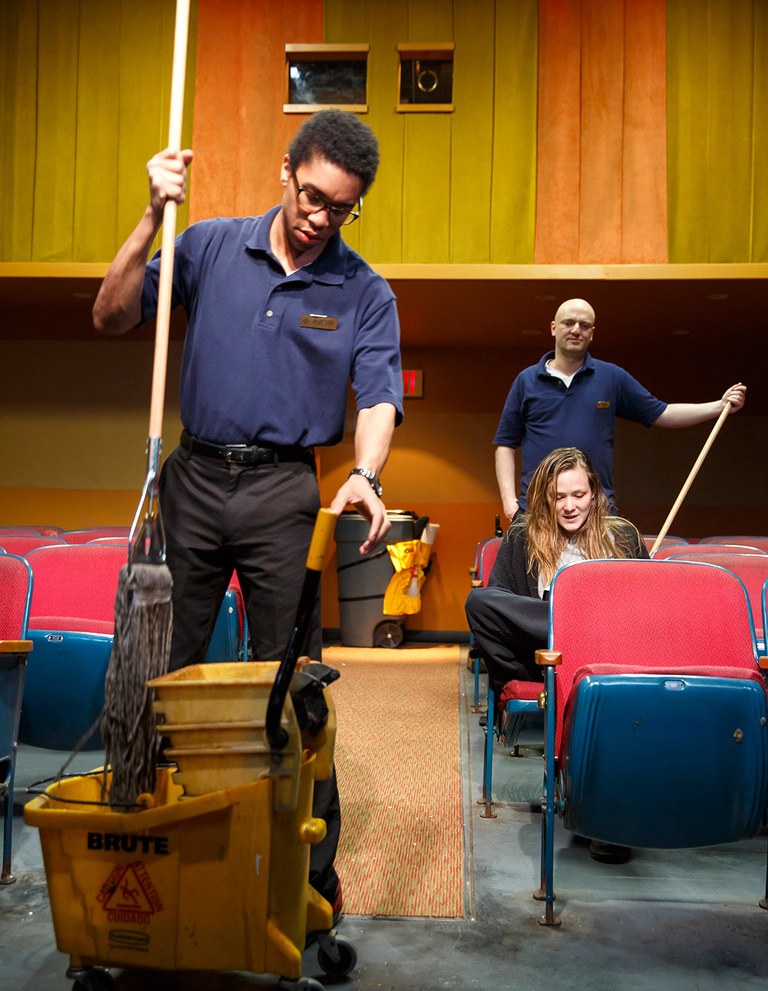No one selects a mop for its glamour. The mop that appears in the second half of The Flick is dowdier than most – a disconsolate tangle that once a day swabs the stickier kinds of refuse in a failing Massachusetts movie theatre.
I don’t know if the mop I saw at the National Theatre had appeared, like actors Louisa Krause and Matthew Maher, in Sam Gold’s original New York production (photo above by Joan Marcus). But whoever cast it was spot on. Its lank head is the sludgy grey of too many late-evening wipedowns in water too infrequently changed. But it is also eloquent about the tenuous workplace bonds and disappointed expectations that make Annie Baker’s play so involving.
The staff of the Flick sell tickets and snacks, and tidy the cinema between screenings. Baker and Gold foster long, ruminative pauses – the play lasts for 3½ hours, much of which is spent watching Sam and Avery, veteran and newbie, trail between rows, sweeping up scattered popcorn and soda cups. What about spilled soda, Avery asks. Sam tells him they do one big mop at the end of the night.
Barbara Ehrenreich spent a few weeks as a cleaner in Maine when researching Nickel and Dimed, her 2001 book about low-paid labour. It was work full of indignities, not the least of which was the impossibility of doing a good job: the ‘Merry Maids’ instruction to give a spray and wipe with an unclean cloth infuriated her.
I’ve seen The Flick twice now, the second time from above, where it became evident that these guys are slightly shoddy cleaners. Popcorn is hurled at a moment of high emotion, and most of the detritus remains for the rest of the play. Sam and Avery – occasionally joined by projectionist Rose – aren’t casual about their work, but you couldn’t describe them as motivated. They move through their back-and-forth routine, methodical but numbed, unless surprised by an abandoned item (manky shoe, snoozing customer), or until halted by a chasm of anxiety or desolation.
When the mop does appear, it seems even more disconsolate than the people wielding it. Plunge, squeeze, wipe, repeat. It deals with spilled sprite and chocolate pudding – at least, they hope it’s just chocolate pudding – but its real dramatic function is to channel the characters’ dissatisfaction.
Especially Sam’s. Disappointed by his colleagues’ small but telling treacheries (and, later, by his own), he’s a master of passive-aggressive mopping. Even when facing away, we see Maher’s shoulders tauten in hurt and anger, before he plunges into the mopwork with furious, silent intent. The scene inspires some of Baker’s best stage directions:
– ‘They mop in terrible silence together.’
– ‘They … squeeze out their mop in the yellow bucket and listen to the horrible squeezing dripping sound.’
– ‘He squeezes the mop in the mop bucket with tremendous power… Sam does not take his eyes off the mop… Sam is staring into the dirty mop water.’
Finally, he goes off to deal with a heinous situation in the gents, and ‘stoically thrusts the mop up into the air like a sword.’
Sam isn’t unheroic. His work isn’t especially fulfilling, and can’t save the Flick, which hasn’t seen a soldout screening since Slumdog Millionaire. He doesn’t ultimately forge friendships, or anything stronger, with Rose or Avery. But he endures, and exits smiling. Not unheroic.
Friends and people you work with
Soon after I left college, a friend who had begun a Proper Job referred to his ‘colleagues.’ The rest of us – working in call-centres, stuffing envelopes with corporate brochures, doing shifts in the box office – must have looked bewildered. ‘There’s no such thing as colleagues,’ scoffed another pal. ‘There are just friends or people you work with.’
For years, I loved her brusqueness… but as time bites, and righteousness fades, ‘colleagues’ turns out to be a useful term. It doesn’t pin you down to warmth of feeling. There’s the colleague whose name you can’t remember, the colleague you slept with, the colleague who tried to get you sacked. Stranger, lover, nemesis, are all too revealing. ‘Colleague’ is safest.
The mop’s a colleague, and a pretty good one. Undemanding, unambitious, unspectacular. It’s not the prop of dreams – but it will prop up a life that too often fades to grey.
Follow David on Twitter: @mrdavidjays


Leave a Reply